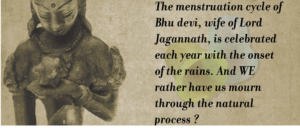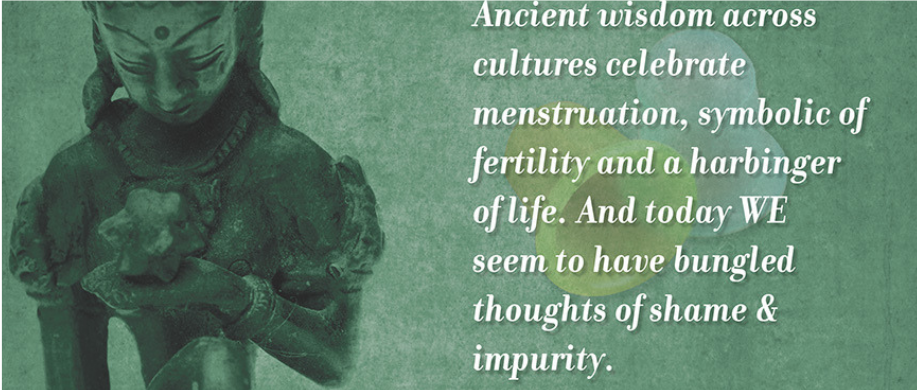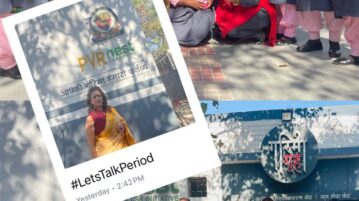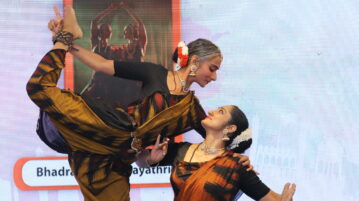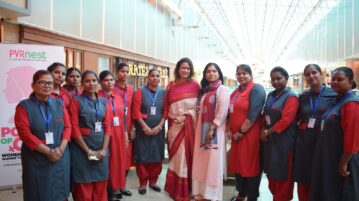Commercialism is opportunistic! The sentence rang a bell when I was discussing with a senior mentor how Menstrual myths may have been fabricated to promote products. Feeding the cycle of menstrual commerce by denouncing ancient wisdom and creating a market for multinational brands to penetrate.
In the last menstrual hygiene workshop I took with adolescent girls in a government-aided school, the questions of whether it is Ok to go to a temple during menstruation, did crop up as did the issue of a woman’s ‘purity’ through the periods. A reactional answer to the same was, why pray to a God that stops listening to a woman through a natural body process. A more logical explanation could be the fear generated due to the lack of appropriate solutions available earlier. A temple has been a social place, so staining or dropping especially while bowing down through menstruation may have been a deterrent to visit. Reinforced with a window to provide rest and further avoiding the demand of sex on the woman, which may lead to a risk of infection through the cycle, a certain set of instructions may have been laid down. But as is seen, Instructions of welfare, often become tools to control and are convoluted to convenience for power.
Ancient wisdom appropriated cotton cloth as a menstrual solution which is a hygienic, economical and sustainable option, as long as it is washed and dried in the sun for reuse or simply disposed of responsibly. Unfortunately, this has been misconstrued as redundant and dirty archaic practice. Popular film actor Akshaye Kumar’s admonition before every film in the theatre reinforces the ‘Ganda Kapada mahavari bimari’ (Dirty Cloth Menstruation disease). The genesis of the ad was through his own depiction of the pad man which is the ‘success story’ of a micro social entrepreneur producing locally made sanitary pads. While the movie is great in getting a conversation started but scratch the surface and it wreaks of poor quality products produced in large numbers which served its purpose only to create a market for sanitary pads manufactured by multinationals, denouncing the age-old wisdom of cloth pads.
As the Mythri speaks site quotes
‘We all know that the forces which control the perceived needs of developing countries are driven by economic outcomes. Given the way they work, in another 5-7 years, don’t be surprised if nothing remained of the wisdom and knowledge that women possessed about their menstrual cycles. It has already happened with the vast knowledge India had about pregnancy and childbirth that now stands destroyed.’
It further claims ‘Over the last 4 years, we (Mythri Speaks Trust) have been approached by leading Sanitary Napkin Manufacturers with the same request camouflaged as CSR activity – help us enter the rural Indian market.’
Today sustainable solutions such as silicone menstrual cups & leak-proof cloth pads with a single plastic layer are available that can be washed and reused over many years. This completely eliminates the non-biodegradable waste produced by each pad, which takes almost 800 years to disintegrate. However, changing the carefully orchestrated negative narrative against sustainable solutions may be a challenge.
In this melee comes the Menstrual hygiene day 2019. One of the most prestigious industry-body is organizing a conference reinforcing unsustainable solutions to its well-endowed member companies in a bid to have a conversation around menstruation. And for this, it has partnered with a large multinational manufacturer of sanitary pads that encourages just to ‘Whisper’ that is if they stand by their name. Did Irony just die!

As a passionate Gender equity worker, I often get into discussions with like-minded folks exchanging notes, learnings, understanding different perspectives in a bid to break my own stereotypical notions (I had to challenge my own mindset to use the menstrual cup when I did for the first time a few years back). More often than not I have always found merit in ancient wisdom, through the few untarnished or not convoluted to convenience, references that may still be present. I had the privilege to record one such conversation with Kusum Mohapatra, President of a prominent foundation. She corroborates the celebration of menstruation in girls through social festivals in ancient India, especially in regions where the Mother Goddess is worshipped as Durga, Chandika, Tarini or Devi. The Devi herself is acknowledged to have a menstrual cycle like that in the Kamakhya Devi temple in Assam. Another such reference that is still prevalent in the east, is the Rajjo festival of Odhisa. We discussed this in detail, as Kusum was born and raised in Odhisa, who further shared her knowledge of similar celebrations in the southern belt of Telangana, Andhra, Tamil Nadu and more. I hope you enjoy this interaction. Do share more information that you may have on the subject or simply share this further as your bit of spreading the light of knowledge through the darkness of ignorance.
